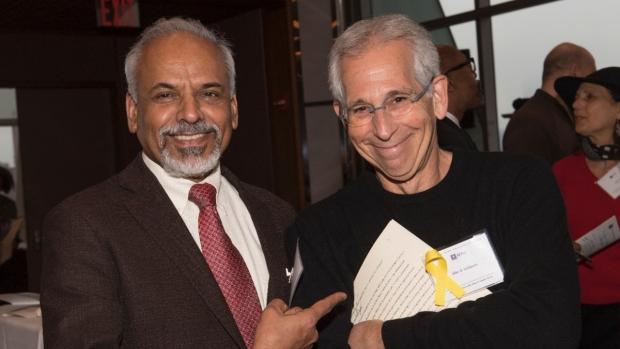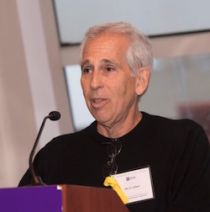Allan Goldstein honored for commitment to education and disability advocacy

Dean Katepalli Sreenivasan and Senior Lecturer Allan Goldstein at the 2016-2017 Martin Luther King, Jr. Faculty Awards. Photo credit: Olivo
“Disability is not a tragedy. It’s just a different way of living,” Senior Lecturer Allan Goldstein told his students during a recent session of his Disabilities Studies course. Since beginning the course five years ago at NYU Tandon, Goldstein’s classroom has provided a space for relationships and partnerships to grow between engineering students and consultants from United Cerebral Palsy of NYC (UCP of NYC) and HeartShare Human Services, an organization that provides programs and services for adults and children with intellectual disabilities.
Goldstein’s focus on building connections between people in and outside the classroom, and fostering the next generation of engineering-minded disability advocates, has earned him multiple accolades, including being featured in Bing Wang’s award-winning documentary “The Ability Exchange,” which followed the relationships and experiences that unfolded between students and consultants during his pioneering disabilities course. In addition, Goldstein received one of NYU’s most prestigious honors on February 7 — the Martin Luther King, Jr. Faculty Award. Presented by NYU Provost Katherine Fleming and the NYU Division of Student Affairs, the award recognizes NYU professors who exemplify King’s teachings and commitment to social justice, and who, as Provost Fleming said at the awards ceremony, “push the envelope and encourage us to think in new ways and … to venture outside the walls of the university and align our scholarship and teaching with our actions.” Goldstein is the first professor from NYU Tandon to receive the Martin Luther King, Jr. Faculty Award.

Allan Goldstein at the MLK, Jr. Faculty Awards.
Read his acceptance speech
One of Goldstein’s former students Eve Fishinevich ’17 nominated him for the Faculty Award, and a committee of past recipients and student leaders selected Goldstein, along with four other professors, to be this year’s recipients. Fishinevich expressed how she and other students were inspired “by his own example to be advocates for change and inclusion towards those whom we may not understand, or to those who are different.” For Goldstein, the award signifies to him that the work he, members of UCP and HeartShare, and his students are doing is valuable. “We are demanding social justice,” he said. “We’re all equal and we all want to have opportunity.”
Students in one section of the Disabilities Studies course work with guest consultants from UCP of NYC, while the other section pairs students with consultants from HeartShare. Each semester, students create digital and video narratives with the consultants, providing them with a platform to share their voice, their story, and their ideas. Goldstein also teaches about disability history and the practical applications of engineering to industries like assistive technology.
During a recent class discussion of stigmas placed upon hidden and visible disabilities, Essie Walker, one of the consultants, shared her experience of living with cerebral palsy. “People won’t help you, and then you feel bad,” highlighting how people only see her wheelchair and disregard her as a person. Goldstein inquired of Walker whether she ever asks for assistance. “Sometimes,” she said. “I like to do things by myself.” Felix Franco, another consultant who returns every semester, shared with the class his mantra: “I don’t let my disability get me down. I keep on moving and learning.”
Goldstein (second from right) participated in a panel discussion following a screening of the documentary featuring his transformational disabilities course
Goldstein’s dedication to disability advocacy fully crystallized when he began teaching this course. “My life is defined by disability, which I really didn’t acknowledge until just a few years ago,” Goldstein said. “All of my choices have always been because of having a brother at Willowbrook, and having gone there every week and understanding that all people are different.” Goldstein’s brother, Fred, lived for 16 years at the Willowbrook State School, a state-funded institution for children with intellectual disabilities well-known for the appalling living conditions the children and staff suffered during its 40-year run. Though Fred is now in a program that views him as a person and nurtures his creative skills and interests, Goldstein acknowledges that many people have misconceptions about people with intellectual or physical disabilities.
These misconceptions are ones that Jonathan Toth, an education specialist with UCP of NYC, sees break down the moment students and consultants first meet. “Many engineering students, prior to taking the course, never actually spent time with persons with a disability,” Toth, who is Goldstein’s counterpart in the classroom, said. “You’re dealing with preconceived prejudices, preconceived notions and stereotypes, and those barriers are broken down.” Since the first class five years ago, Toth has witnessed significant growth processes in the consultants and students. One consultant Paul Tedisco launched his own business, Limitless Stylus, collaborating with NYU Tandon engineering students to create a tablet and smartphone stylus designed for individuals with limited hand mobility.
Oswaldo Cardona, Direct Support Professional at HeartShare, expressed how members of HeartShare’s Day Program enrolled in Goldstein’s course are initially very quiet with their fellow classmates, but that quickly changes. “Another dimension of people’s lives opens up. I see it every semester,” Cardona said. “There are not enough superlatives to describe Allan’s importance to our program.” Edwin Corchado, Senior Direct Support Professional at HeartShare, added that throughout the semester, both students and consultants open themselves up to each other.
Connections between people with and without disabilities “expands your world,” Goldstein said, sharing how many of his engineering students incorporate assistive technology, universal design, and accessibility into their daily lives and research interests. “Education’s the secret. Education is communication, and that’s what I’m focusing on,” Goldstein said.
Camila Ryder
Graduate School of Arts and Science
Master of Arts in English Literature, Class of 2018




